Resume
Machine Learning Researcher Cover Letter Examples

May 29, 2025
|
12 min read
Enhance your machine learning researcher cover letter skills and make a compelling case. Learn tips to express your qualifications while adding a spark of personality. Turn the "data" into "da-yeah" with these simple steps.
4.70 Average rating
Rated by 348 people
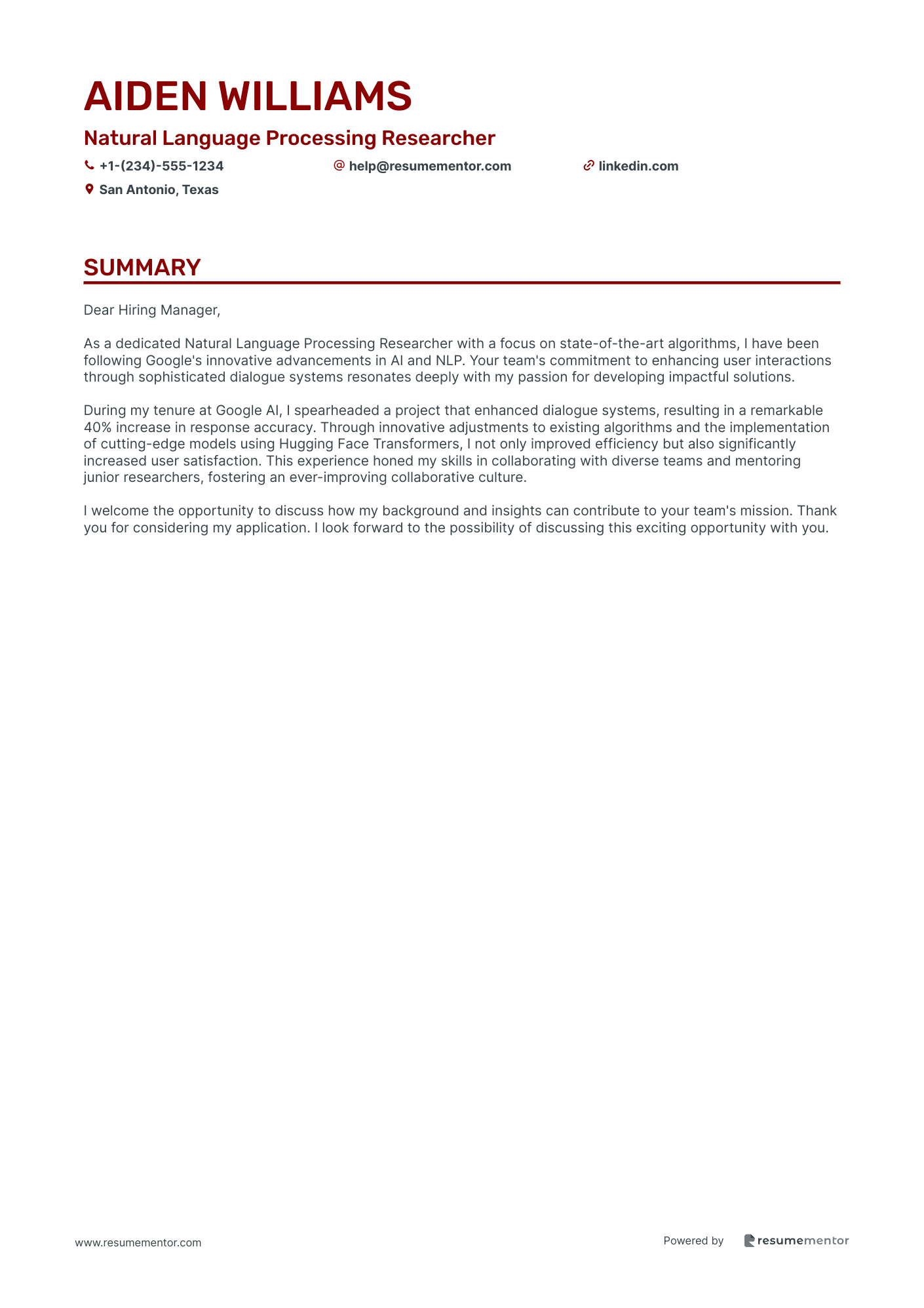
Natural Language Processing Researcher
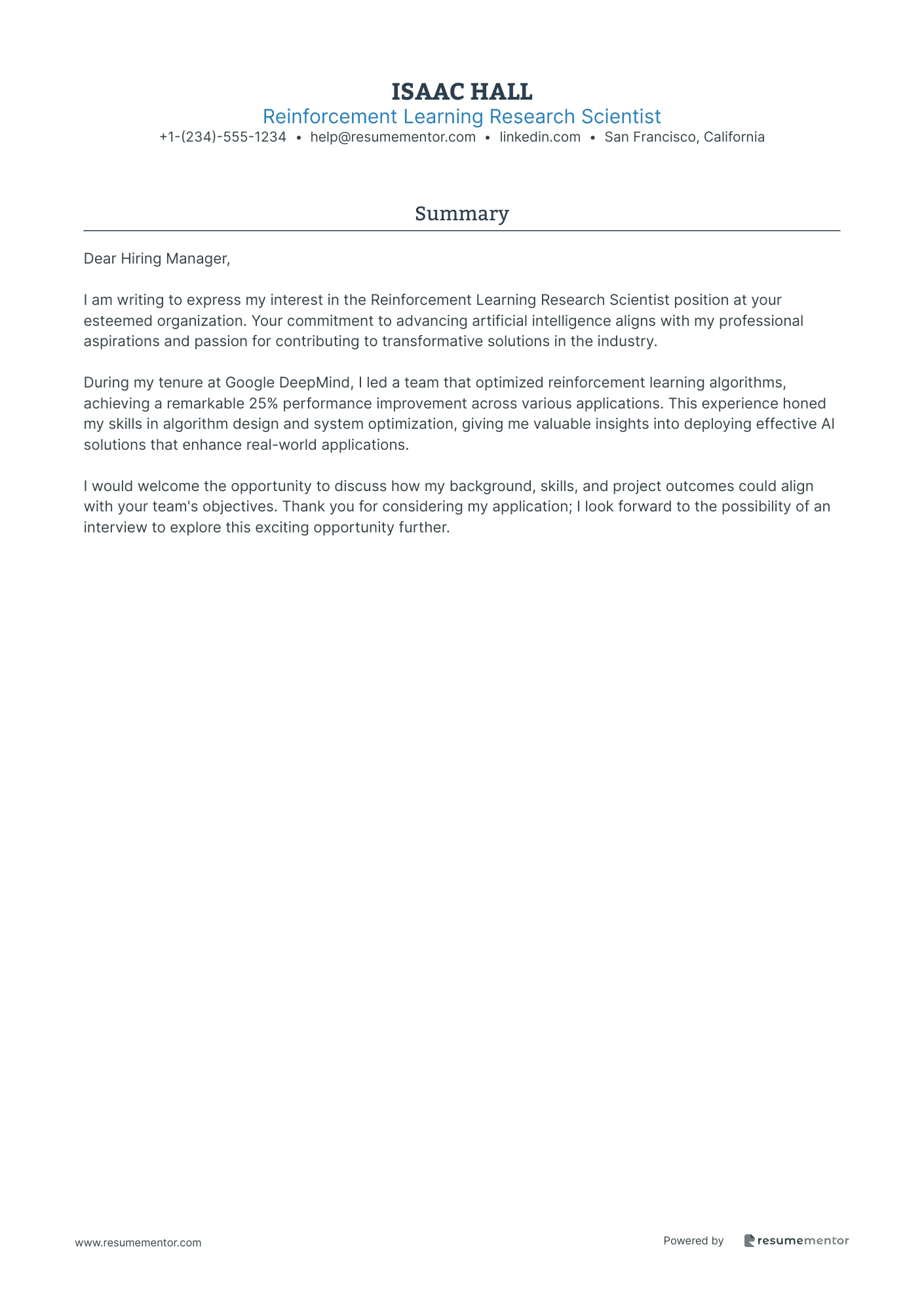
Reinforcement Learning Research Scientist
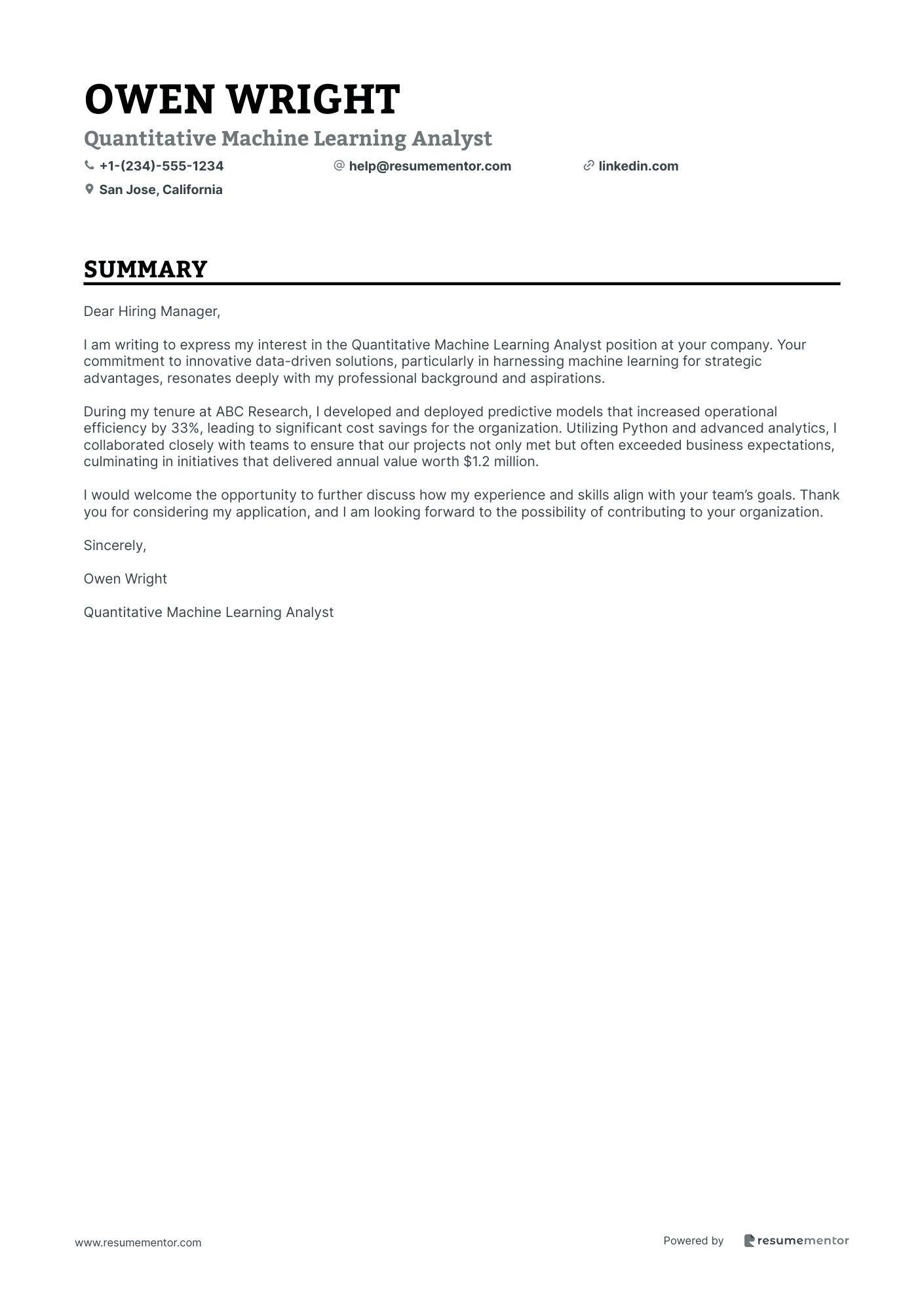
Quantitative Machine Learning Analyst
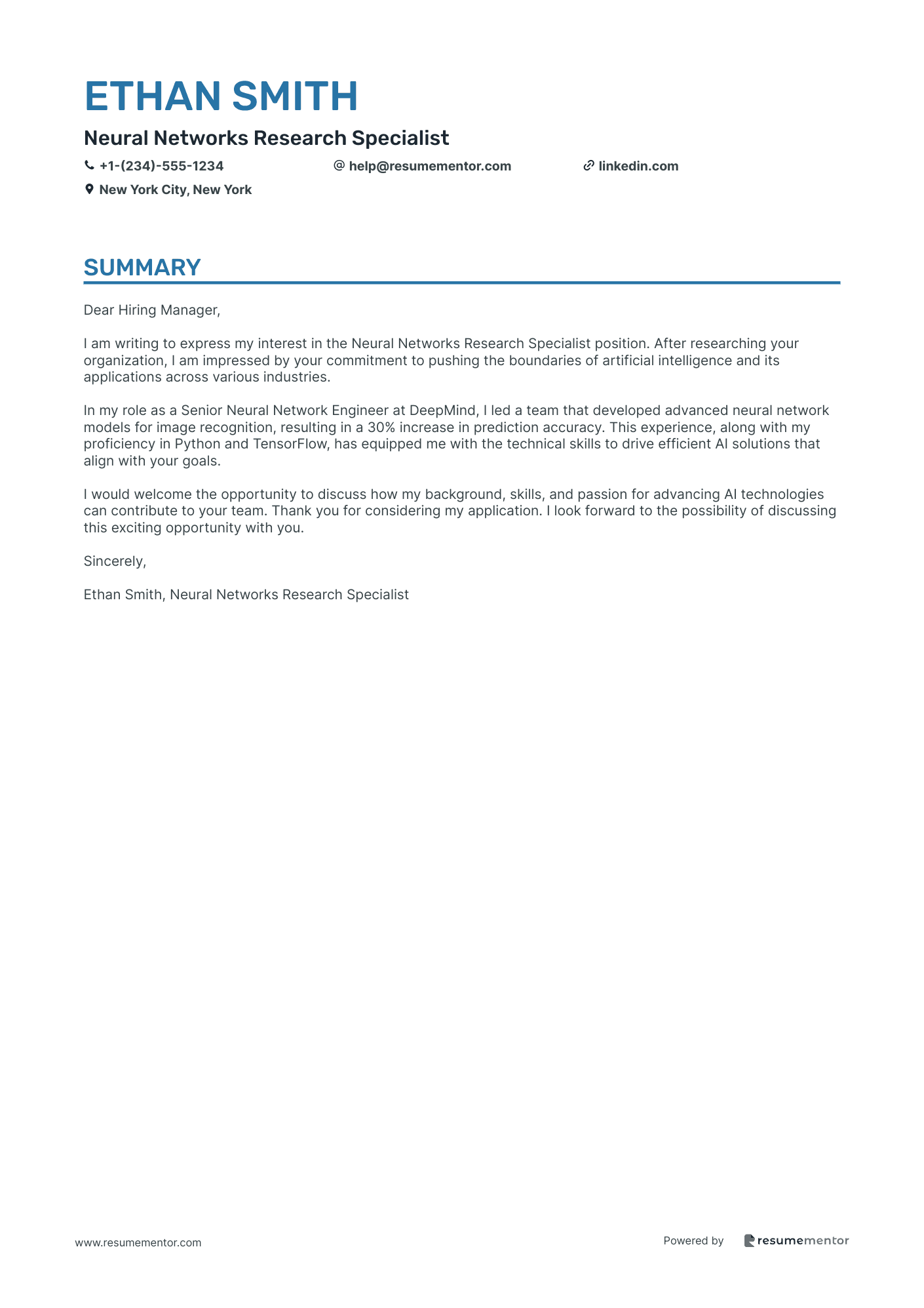
Neural Networks Research Specialist
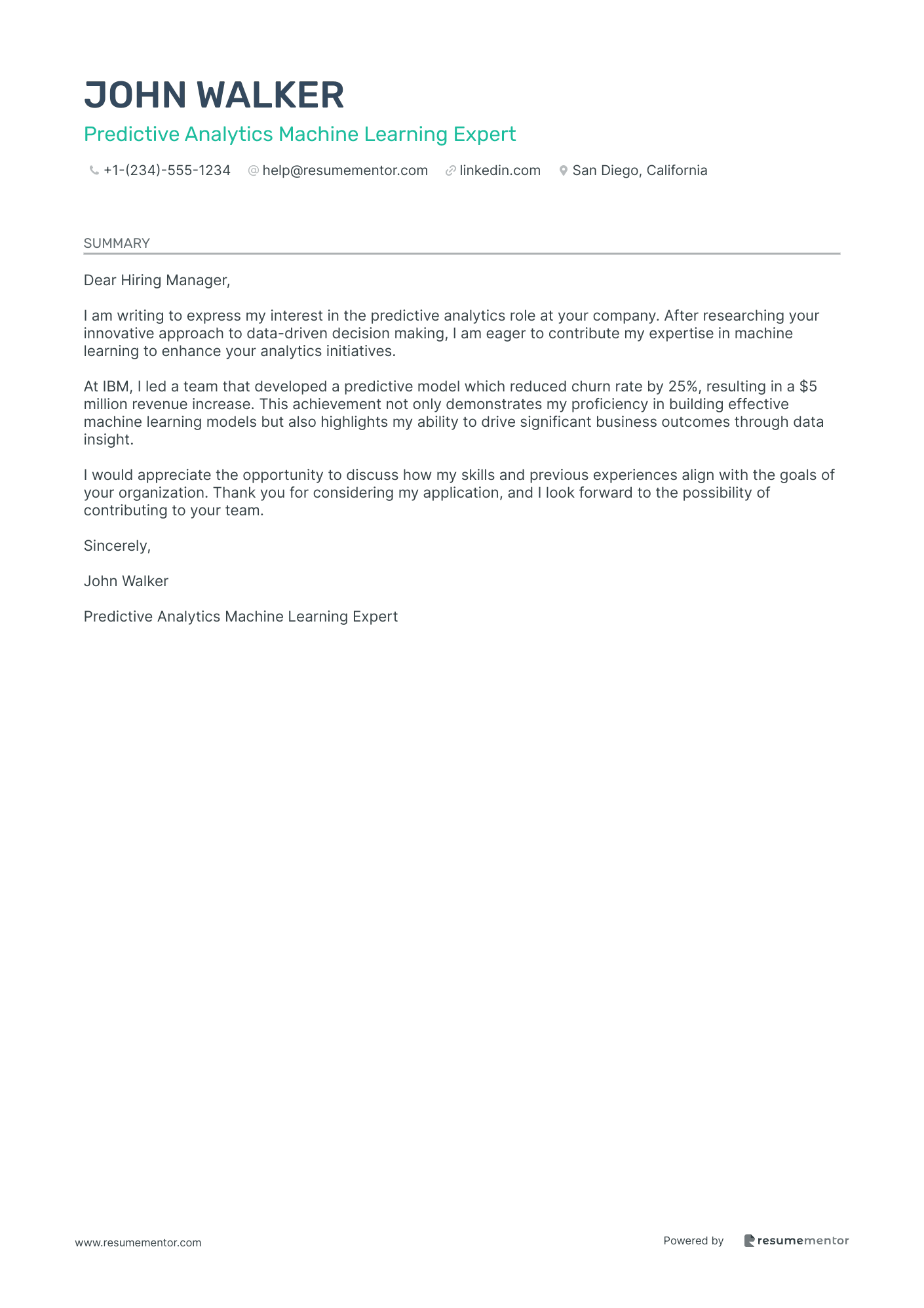
Predictive Analytics Machine Learning Expert
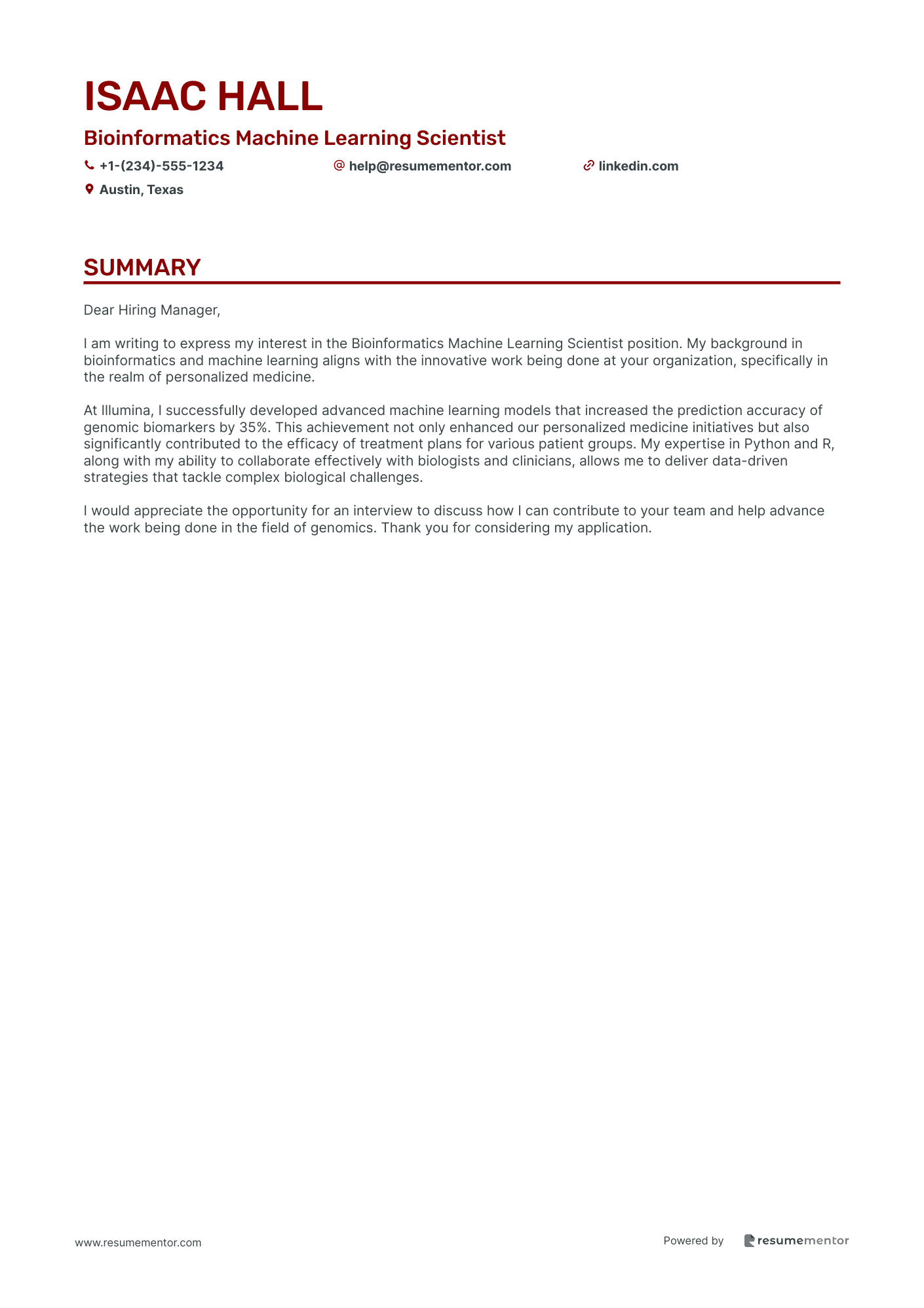
Bioinformatics Machine Learning Scientist
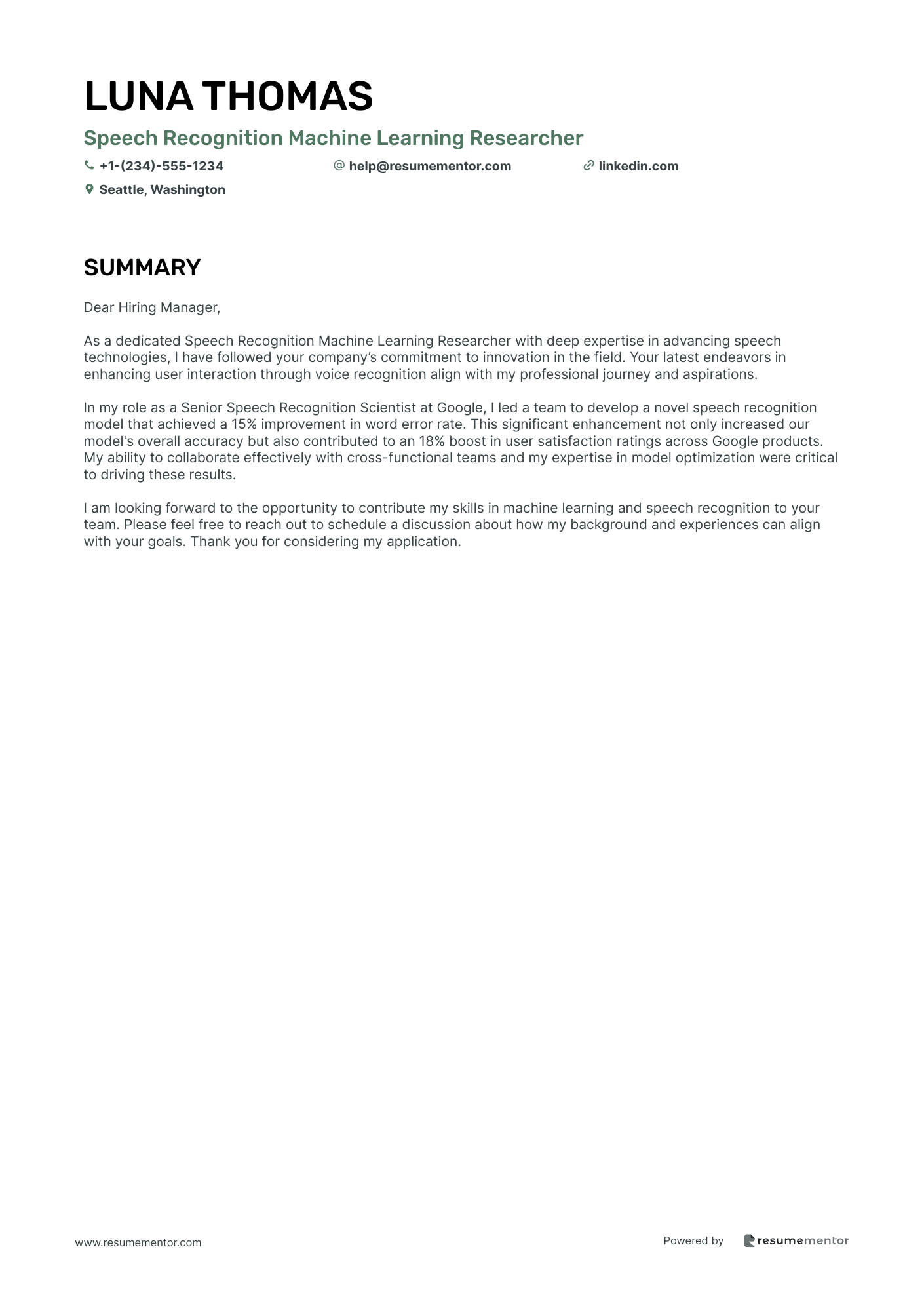
Speech Recognition Machine Learning Researcher
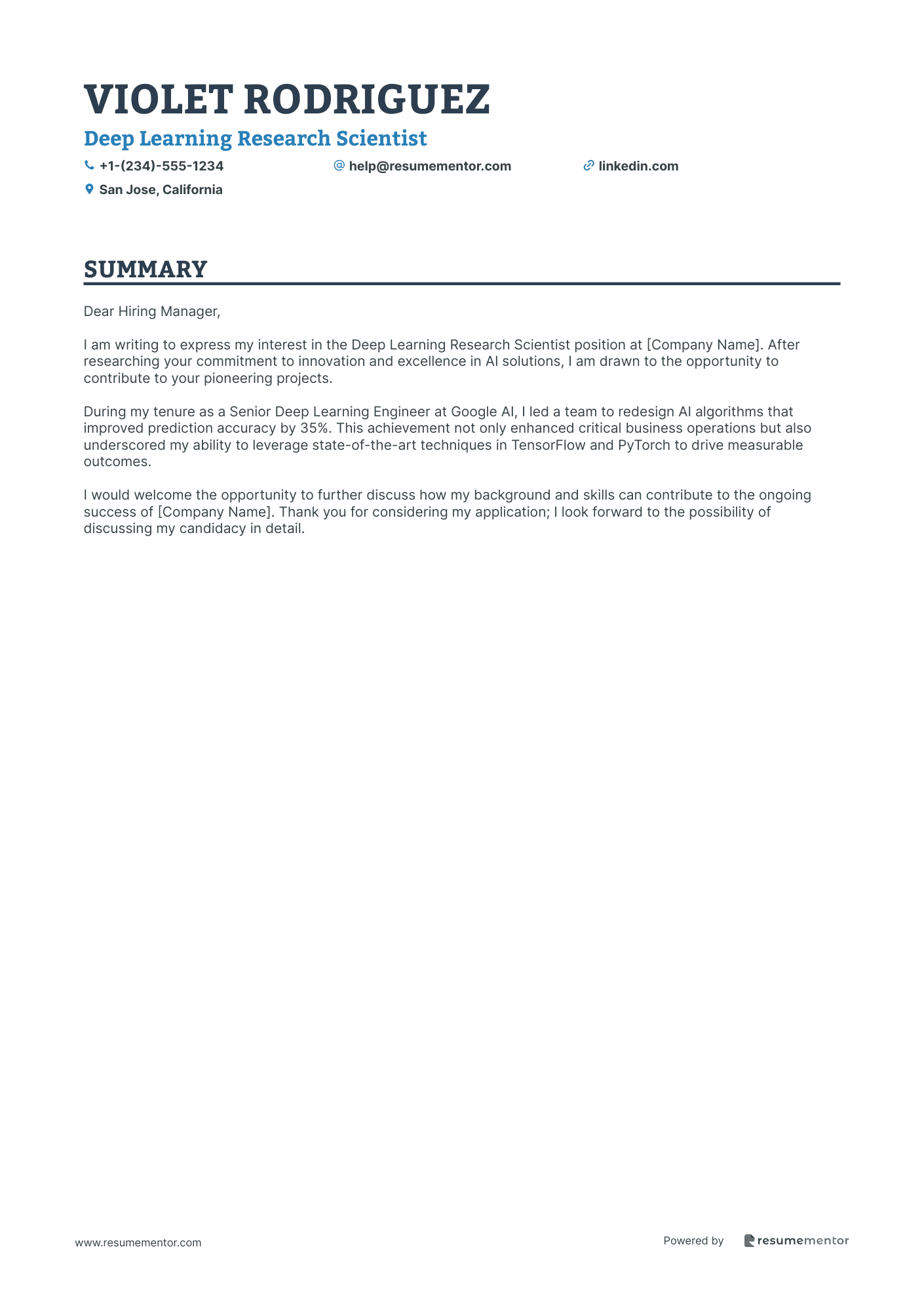
Deep Learning Research Scientist

Natural Language Processing Researcher cover letter sample
When applying for this position, it’s important to highlight your experience with machine learning algorithms and data processing. Showcase any relevant academic projects or research, especially those involving deep learning or neural networks. Mention programming languages you’re proficient in, such as Python or R, and any frameworks like TensorFlow or PyTorch that you have utilized. Include examples of how your contributions have led to improvements in model accuracy or processing efficiency. Use specific metrics to demonstrate impact and show your analytical skills in action.
Aiden Williams
Natural Language Processing Researcher
Summary
Dear Hiring Manager,
As a dedicated Natural Language Processing Researcher with a focus on state-of-the-art algorithms, I have been following Google's innovative advancements in AI and NLP. Your team's commitment to enhancing user interactions through sophisticated dialogue systems resonates deeply with my passion for developing impactful solutions.
During my tenure at Google AI, I spearheaded a project that enhanced dialogue systems, resulting in a remarkable 40% increase in response accuracy. Through innovative adjustments to existing algorithms and the implementation of cutting-edge models using Hugging Face Transformers, I not only improved efficiency but also significantly increased user satisfaction. This experience honed my skills in collaborating with diverse teams and mentoring junior researchers, fostering an ever-improving collaborative culture.
I welcome the opportunity to discuss how my background and insights can contribute to your team's mission. Thank you for considering my application. I look forward to the possibility of discussing this exciting opportunity with you.
Reinforcement Learning Research Scientist cover letter sample
When applying for this role, it's essential to showcase your experience with machine learning frameworks, such as TensorFlow or PyTorch. Highlight any projects involving deep learning or natural language processing. Emphasize your proficiency in programming languages like Python and R, as well as any relevant coursework in algorithms or statistics. Providing examples of how your research has led to improved model accuracy or efficiency can strengthen your application. Follow a 'skill-action-result' format to demonstrate the impact of your work on previous projects or teams.
Isaac Hall
Reinforcement Learning Research Scientist
Summary
Dear Hiring Manager,
I am writing to express my interest in the Reinforcement Learning Research Scientist position at your esteemed organization. Your commitment to advancing artificial intelligence aligns with my professional aspirations and passion for contributing to transformative solutions in the industry.
During my tenure at Google DeepMind, I led a team that optimized reinforcement learning algorithms, achieving a remarkable 25% performance improvement across various applications. This experience honed my skills in algorithm design and system optimization, giving me valuable insights into deploying effective AI solutions that enhance real-world applications.
I would welcome the opportunity to discuss how my background, skills, and project outcomes could align with your team's objectives. Thank you for considering my application; I look forward to the possibility of an interview to explore this exciting opportunity further.
Quantitative Machine Learning Analyst cover letter sample
When applying for this position, it's essential to showcase your technical skills in programming languages such as Python or R, as well as your familiarity with machine learning frameworks like TensorFlow or Scikit-learn. Highlight any experience with data analysis and statistical modeling, along with relevant coursework or certifications in data science or machine learning. Use specific examples to demonstrate how your analytical skills have driven successful outcomes in previous projects. Focus on quantifiable achievements to illustrate your impact, using metrics to reinforce your capabilities.
Owen Wright
Quantitative Machine Learning Analyst
Summary
Dear Hiring Manager,
I am writing to express my interest in the Quantitative Machine Learning Analyst position at your company. Your commitment to innovative data-driven solutions, particularly in harnessing machine learning for strategic advantages, resonates deeply with my professional background and aspirations.
During my tenure at ABC Research, I developed and deployed predictive models that increased operational efficiency by 33%, leading to significant cost savings for the organization. Utilizing Python and advanced analytics, I collaborated closely with teams to ensure that our projects not only met but often exceeded business expectations, culminating in initiatives that delivered annual value worth $1.2 million.
I would welcome the opportunity to further discuss how my experience and skills align with your team’s goals. Thank you for considering my application, and I am looking forward to the possibility of contributing to your organization.
Sincerely,
Owen Wright
Quantitative Machine Learning Analyst
Neural Networks Research Specialist cover letter sample
When crafting your cover letter, focus on your relevant experience with machine learning frameworks such as TensorFlow or PyTorch. Highlight any projects where you implemented deep learning models, explaining the approach and outcomes clearly. Emphasize your proficiency in programming languages like Python or R, showcasing specific examples of algorithms you've developed. If you have contributed to published research or papers, mention these accomplishments to demonstrate your expertise. Lastly, detailing any collaborations with interdisciplinary teams can show your ability to work effectively in diverse environments.
Ethan Smith
Neural Networks Research Specialist
Summary
Dear Hiring Manager,
I am writing to express my interest in the Neural Networks Research Specialist position. After researching your organization, I am impressed by your commitment to pushing the boundaries of artificial intelligence and its applications across various industries.
In my role as a Senior Neural Network Engineer at DeepMind, I led a team that developed advanced neural network models for image recognition, resulting in a 30% increase in prediction accuracy. This experience, along with my proficiency in Python and TensorFlow, has equipped me with the technical skills to drive efficient AI solutions that align with your goals.
I would welcome the opportunity to discuss how my background, skills, and passion for advancing AI technologies can contribute to your team. Thank you for considering my application. I look forward to the possibility of discussing this exciting opportunity with you.
Sincerely,
Ethan Smith, Neural Networks Research Specialist
Predictive Analytics Machine Learning Expert cover letter sample
When applying for this role, it's essential to showcase your experience with data analysis and statistical modeling. Highlight any proficiency in programming languages, like Python or R, especially in libraries used for machine learning. Mention pertinent projects where you've successfully built predictive models, detailing the impact on decision-making. Listing relevant certifications, such as in data science or machine learning, can strengthen your application. Provide specific examples that demonstrate your problem-solving skills and how your insights led to improved outcomes or efficiencies in previous roles.
John Walker
Predictive Analytics Machine Learning Expert
Summary
Dear Hiring Manager,
I am writing to express my interest in the predictive analytics role at your company. After researching your innovative approach to data-driven decision making, I am eager to contribute my expertise in machine learning to enhance your analytics initiatives.
At IBM, I led a team that developed a predictive model which reduced churn rate by 25%, resulting in a $5 million revenue increase. This achievement not only demonstrates my proficiency in building effective machine learning models but also highlights my ability to drive significant business outcomes through data insight.
I would appreciate the opportunity to discuss how my skills and previous experiences align with the goals of your organization. Thank you for considering my application, and I look forward to the possibility of contributing to your team.
Sincerely,
John Walker
Predictive Analytics Machine Learning Expert
Bioinformatics Machine Learning Scientist cover letter sample
When crafting your cover letter, be sure to emphasize your expertise in computational biology and machine learning techniques. Highlight any experience with data analysis and programming languages such as Python or R. Mention relevant coursework or projects that demonstrate your skills in statistical modeling or algorithm development. Provide examples that showcase how your work has improved data interpretation or accelerated research outcomes. Use a 'skill-action-result' framework to clearly illustrate your contributions and the tangible impact they had on your previous projects or teams.
Isaac Hall
Bioinformatics Machine Learning Scientist
Summary
Dear Hiring Manager,
I am writing to express my interest in the Bioinformatics Machine Learning Scientist position. My background in bioinformatics and machine learning aligns with the innovative work being done at your organization, specifically in the realm of personalized medicine.
At Illumina, I successfully developed advanced machine learning models that increased the prediction accuracy of genomic biomarkers by 35%. This achievement not only enhanced our personalized medicine initiatives but also significantly contributed to the efficacy of treatment plans for various patient groups. My expertise in Python and R, along with my ability to collaborate effectively with biologists and clinicians, allows me to deliver data-driven strategies that tackle complex biological challenges.
I would appreciate the opportunity for an interview to discuss how I can contribute to your team and help advance the work being done in the field of genomics. Thank you for considering my application.
Speech Recognition Machine Learning Researcher cover letter sample
When applying, emphasize your experience with natural language processing and algorithm development. Highlight any projects where you've improved speech recognition accuracy or reduced latency. If you have skills in machine learning frameworks like TensorFlow or PyTorch, mention those specifically. Include any relevant coursework or certifications, like in deep learning or phonetics. Use quantifiable achievements, such as percentage improvements in model performance, to demonstrate your contributions. Providing examples of teamwork in research settings can also strengthen your application.
Luna Thomas
Speech Recognition Machine Learning Researcher
Summary
Dear Hiring Manager,
As a dedicated Speech Recognition Machine Learning Researcher with deep expertise in advancing speech technologies, I have followed your company’s commitment to innovation in the field. Your latest endeavors in enhancing user interaction through voice recognition align with my professional journey and aspirations.
In my role as a Senior Speech Recognition Scientist at Google, I led a team to develop a novel speech recognition model that achieved a 15% improvement in word error rate. This significant enhancement not only increased our model's overall accuracy but also contributed to an 18% boost in user satisfaction ratings across Google products. My ability to collaborate effectively with cross-functional teams and my expertise in model optimization were critical to driving these results.
I am looking forward to the opportunity to contribute my skills in machine learning and speech recognition to your team. Please feel free to reach out to schedule a discussion about how my background and experiences can align with your goals. Thank you for considering my application.
Deep Learning Research Scientist cover letter sample
When applying for this position, it's essential to showcase any experience with machine learning frameworks like TensorFlow or PyTorch. Highlight your proficiency in programming languages such as Python or R, as these are critical for research and development. Emphasize your academic background, particularly any research publications or projects related to neural networks or computer vision. Provide specific examples of your work, detailing how your contributions led to advancements in model accuracy or efficiency using a 'skill-action-result' format to demonstrate your impact.
Violet Rodriguez
Deep Learning Research Scientist
Summary
Dear Hiring Manager,
I am writing to express my interest in the Deep Learning Research Scientist position at [Company Name]. After researching your commitment to innovation and excellence in AI solutions, I am drawn to the opportunity to contribute to your pioneering projects.
During my tenure as a Senior Deep Learning Engineer at Google AI, I led a team to redesign AI algorithms that improved prediction accuracy by 35%. This achievement not only enhanced critical business operations but also underscored my ability to leverage state-of-the-art techniques in TensorFlow and PyTorch to drive measurable outcomes.
I would welcome the opportunity to further discuss how my background and skills can contribute to the ongoing success of [Company Name]. Thank you for considering my application; I look forward to the possibility of discussing my candidacy in detail.
Related Articles

Continue Reading
Check more recommended readings to get the job of your dreams.
Resume
Resources
Tools
© 2026. All rights reserved.
Made with love by people who care.
